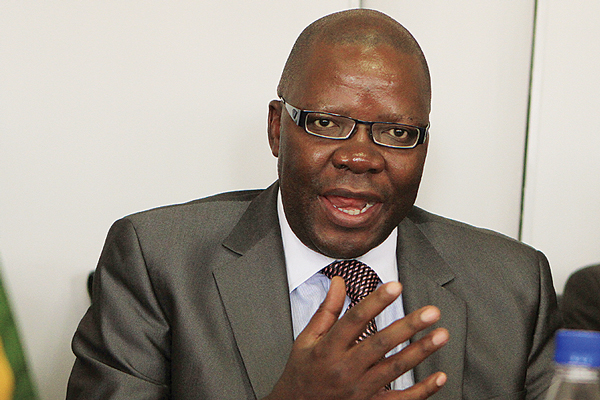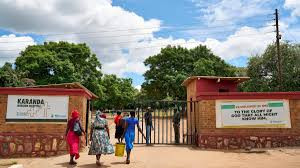
Former Finance minister Tendai Biti (TB) says the government is trying to bring back the loathed Zimbabwe dollar through the back door by introducing bond notes. The People’s Democratic Party president spoke to our chief reporter Everson Mushava about Zimbabwe’s current woes and other problems bedevilling the country. Below are excerpts of the interview.
EM: What are your thoughts on the current economic situation in the country?
TB: We have always argued consistently that this government is absolutely clueless. (Finance minister Patrick) Chinamasa’s comments do not surprise anyone. The average Zimbabwean is suffering, our per capita income is now less than $180. About 79% of the people are now living in poverty, surviving on less than $1,25 per day courtesy of this regime.
The whole country is now a mass industrial grave site. People are unemployed, people are homeless, and people have no food to put on the table, thanks to this government.
The recent issue on the restoration of the bond paper is evidence beyond reasonable doubt of the failure of this government to govern the Republic. That’s a disastrous move.
EM: Normally, bonds should have expiry dates, ours do not, does that mean they are a currency?
TB: There is technical confusion, about the term bond. The word bond denotes a loan or a legal instrument issued by the Finance minister in terms of the Public Finance Management Act.
But just like bond coins, bond notes are being issued by the Reserve Bank of Zimbabwe (RBZ) as legal tender signed in (accordance with) the RBZ Act, meaning to say bond notes will be money and not a prescribed instrument.
- Chamisa under fire over US$120K donation
- Mavhunga puts DeMbare into Chibuku quarterfinals
- Pension funds bet on Cabora Bassa oilfields
- Councils defy govt fire tender directive
Keep Reading
So the bond paper will also be a currency. It will also be used as legal tender. It will be used interchangeably with the US dollar and for that reason, there should be no doubting in anyone’s mind that the central bank is trying to reintroduce the Zimdollar. That will be a disaster.
EM: Why is it wrong for Zimbabwe to re-introduce its own local currency now?
TB: Zanu PF intends to introduce the Zimdollar, which it is calling the bond notes, backed by a $200 million from the Africa Export and Import Bank (Afeximbank). And that is a disaster in a number of ways. firstly, the whole idea of re-introducing the Zimdollar is just insane. This country was raped by its own currency in 2007 and 2008.
The Zimdollar was over printed and as a result, we had a broad money supply which was over 1 000% of the gross domestic product (GDP), and when that happens, we have got too much money chasing too few goods and the net result is that, the currency ends up not functioning.
That is exactly what happened. There is no way that this country can even think of introducing its own currency without exports of at least $15 billion.
Our exports right now are less than $3 billion, our imports are around $7 billion, and we have a current account of at least $3 billion. So we are in the negative.
Our current account is more than 15% of GDP. How do we introduce a local currency under these circumstances? All what will happen is that it will be attacked because of the mismatch between imports and exports and it will end up bastardised, like what happened before.
The argument of the central bank is that the introduction of the bond notes is to support and give incentives to our exporters. But we have few industries that have been exporting with or without incentives anyway, because the demand for their commodity is just inelastic.
The products that we have been exporting are largely in the commodity sectors, so we have been exporting raw commodities, platinum, gold, and so forth, whether or not you give an export incentive, people are going to export.
We have also been exporting agricultural commodities, tobacco, grains, fruits and flowers. Again, there is demand for those commodities, and in any event, if our exports have been averaging $3 billion, the $200 million from Afreximbank measured against the $3 billion is meaningless. It’s a drop in the ocean.
EM: If you were the Finance minister, how would you have gone about it?
TB: The real issue in Zimbabwe is not exports of $3 billion, but that companies have collapsed, we have de-industrialisation. If ever there is any incentive, it should be given to new companies and [used to] resuscitate companies.
So if I were the Finance minister, I would take that $200 million from Afreximbank and capitalise distressed companies and the Zimbabwe Trade Fund, so that struggling companies can restart. That is the real challenge here. We should focus on creating supply side reform; that is where our focus should be.
Why should you want to give export incentives to Murowa Diamonds, or to Zimplats where there is no value-addition? So the whole policy is flawed right now.
The focus should be to fund those companies that have closed so that exports will move from $3 billion to $10 billion.
EM: Observers say as long as there are inconsistencies and infighting in Zanu PF, we won’t have any solution in sight to the economic problems that the country is facing. What is your comment on that?
TB: There are two sides to it. The first home truth is that Zanu PF on its own can never run this country. The country’s GDP in the past 36 years has been constantly at $10 billion on average.
That means after 36 years of the Mugabe government, they have failed to expand the economy whereas other countries like Mozambique, Zambia and Kenya have more than trebled their GDP in the same period, with or without hydro-carbons. For countries that have hydro-carbons, it has been worse. Angola used to be a $7 billion economy and now it is a $120 billion economy.
Zanu PF has failed to grow this economy because it lacks craft competence. Secondly, Zanu PF doesn’t care.
So even if factionalism is to abate in Zanu PF right now, they can’t run the economy.
But more importantly, this is proof that we need political reforms in this country to bring down the walls of this authoritarian government.
The opposition political parties must put their house in order, firstly on this issue of bond notes and on other issues.
If we are unable to protect Zimbabweans, on this particular issue, then there is nothing we will be doing.
We need to form a popular front and push for electoral reforms before 2018 to give our people a fighting chance.
EM: Let us say you are invited by President Robert Mugabe today for advice, what would you say to him?
TB: That he must resign, and go and rest. The other thing is, we need a transitional government to create a soft landing. The transitional government should attend to 10 issues that will bring back the country’s glory days and usher in a new political dispensation.
EM: Can you clarify, what are the 10 issues?
TB: First, maintaining law and order, maintain the social contract, economic turnaround, aligning laws to the Constitution, electoral reforms, strengthening our institutions, putting in place a transitional government, putting an end to the land reform and restore the land market and security sector transformation.
Ninth, security sector transformation. We also have to create a young independent security sector that will serve the people of Zimbabwe. There is no reason why a general should be over 50 years. The last will be to have reengagement with all countries, the United States, China, Europe and other countries.
EM:. What would be your immediate solution to the cash crisis?
TB: There should be an iron clamp position, so that government cannot unlawfully siphoned RTGS accounts at the Reserve Bank. Government must repay and stop issuing Treasury bills. It should stop printing Treasury Bills.
There has been gross non-disclosure about the cause of the cash crisis. Let us have honest about the causes of the cash crisis. When you put your money in a bank, and you demand your money, you should be able to get it back. The problem only comes when someone comes and takeS your money from the bank.
The bank can’t pay you out. We are having a cash crisis because someone went and raided the people’s balances in the banks.
Banks will, only have mirror balances, the real cash is gone to the government, which has raided RTGS accounts at the central bank to finance its recurrent expenditure.
There is an argument that, false one again, that neighbouring countries including South African, whose rand is on the slide are coming to siphon the US dollar.
There is no bank history, there is no one who is going to the central bank and saying, I have come to raid you, everything that is happening is happening in the process of commerce.
So US dollars are going out because we are importing, but people who are importing are not borrowing.
They are using their own money, they are using free funds. Zimbabwe’s imports are over $7 billion, it is not the government that is financing that. Its free funds.
So people can’t start complaining that money is going outside when our imports are $7 billion and financed by free funds.
So why are you trying to interfere with something that you are not contributing, it is not the government that is financing these huge exports.
Why are you trying to regulate an area that you are not involved? It’s not your business. They are trying to control things that they cannot control.
EM: What do you think is motivating the decision by Zanu PF to introduce bond notes? Are the reasons economic or political?
TB: When I was Finance minister during the inclusive government, we still had huge imports, but why was there no shortage of cash. What has changed now is that we now have a fascist regime, which suffers from what I call fiscalitise, a diseases that believes that money grows on trees, then spent without producing.
They do not spend their money, they also steal other people’s money.
They now want to bring the Zimdollar so that they can monetize the elections in the coming 20 months.
They have to monetise their huge election promises, they have to bring back the Zimdollar because the Zanu PF elites are drowning in US debts, so they want to bring the Zimdollar so that they clear all their debts that is clogging the non-performing loans right now.









